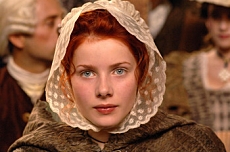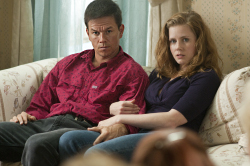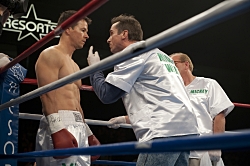Interview with Tom Tykwer (Director)
Ben Whishaw’s Interview (Grenouille)
 Tom Tykwer’s Interview (Director)
Tom Tykwer’s Interview (Director)
Popular on LondonNet
 German born director Tom Tykwer made his feature debut in 1993 with Deadly Maria, which he followed with Winter Sleepers. He scored an international hit with Run Lola Run (1998). His other films include The Princess & The Warrior (2000) and Heaven (2002).
German born director Tom Tykwer made his feature debut in 1993 with Deadly Maria, which he followed with Winter Sleepers. He scored an international hit with Run Lola Run (1998). His other films include The Princess & The Warrior (2000) and Heaven (2002).
Perfume: The Story of A Murderer is adapted – by Tykwer, Andrew Birkin and Bern Eichinger – from Patrick Süskind’s international bestseller. It stars Ben Whishaw as Jean-Baptiste Grenouille, a young man with a rare gift and an amoral nature.
How happy you must have been to go and see a production of Hamlet at The Old Vic, and finally find your Grenouille on stage?
I sat down and thought ‘thank God, finally!’, because it had been such a long search. Somehow I knew there would be the moment when I got an intuitive sense that we had the right guy. That’s what it was, Ben and I hit it off immediately on a level that told me we could tackle this together. He let himself fall into the character but he’s a very intelligent guy, intellectually capable of all the complexities that the novel contained and the film needs to deliver. So sometimes you’d ask him something completely instinctive or physical, and five minutes later be discussing something really complicated that you wanted to capture. And he was able to always fulfil both sides. That’s great for me, because that’s the way I direct.
He is exceptional in the film, isn’t he?
He’s amazing. It’s a combination of skills, his body language goes together with the way he speaks, the way he looks, and this continuing, ambiguous power that he brings with him. There’s this whole feeling that he is somebody extremely innocent and extremely dark at the same time, a feeling that there is something feral about him as well as a very vulnerable human being.
How close were you to casting someone else who may have been less suitable, or to the film falling through altogether?
I was always clear that we needed to wait. If it took us ten years we would wait ten years until we found the guy who could play this role. And I felt that once we had him we could convince the financiers.
Do you see a parallel in Grenouille manipulating the crowd, as he does at one point in the film, and a director manipulating his audience?
There’s an obvious subtext within the film that resonates all the way through, about manipulation. Of peoples’ emotions of course, that is the very substance of cinema. Somebody tries to make people believe in him being someone extraordinary, by putting on a disguise. We’re heightening the appearance of personalities and characters and actors to a degree that they become desirable because we know people long for things out of their reach. We know that because we are the same as them, and so we kind of play with our own desires. Life is dominated by manipulation.
There is, in that crowd scene, a kind of mass hysteria that Grenouille sparks, isn’t there?
In any mass situation – and we’ve had particular experiences of that in Germany – the effect of being part of that crowd when they get excited is that you tend to enhance it rather than get away from it. It’s like a virus. There’s something about letting your ‘self’ drop and sinking into that person or group that you want to be with. That’s why we conceived the entire experience there a little bit like a rock concert. I also always imagined the experience of Grenouille being like one of those pop stars, who when you’re in the concert you also get lost in this whole hysterical feeling for them.
But therein lies his pain too, doesn’t it?
Of course there’s also a very complex narcissistic element involved with every single person in the room. They also project themselves into that star and imagine themselves being up there, but at the same time we also all have a secret knowledge of the loneliness of that one person up there. About the separation that is there between him or her and us. We know all of the stories about these super lonely rock stars that are everywhere, who die lonely or commit suicide.
Is the harder thing directing a big scene like this that conveys so much, or an intimate close up of an actor?
It’s equally complicated to do, it’s more or less equally demanding because of the concentration and the focus you need in order to get the intensity of both of those things. It was demanding and quite exhausting.
Do you identify modern resonances in this story that contemporary audiences can take away from it?
I think that’s the real quality of it, that it opens many doors into different territories and subjects that are not thrown at you or pushed at you, this is what it’s ultimately about. It obviously implies a lot of things, a lot of thoughts about celebrity and manipulation, and how power and influence have gone through a metamorphosis throughout the centuries. There’s so much stuff to chew on, I loved that about the book. Strangely enough period pieces can often bring us closer to subjects that are important for today, rather than stories that pick up on them directly.
This is big international movie, with all the complication that might entail. Is it true you were directing it in four different languages?
Yeah, but the set language was English and of course all the main actors are English. But because we were shooting parts in France, parts in Spain and we had a big German crew it’s true that it was a bit muddled at times. But never to a degree that I think was disturbing. I always take my crew with me and that’s very important for me. The DP has shot all my films since my first short film. And the production designer and the costume designer are all people that I’ve known for a long time, so this whole crew is kind of a family, they all have their secret codes, they’re like buddies. We’ve known each other for a long time, so there is this family thing, and a lot of German mumbling. So I think Ben sometimes had this problem that he was sometimes surrounded by all these Germans, he was in the middle sometimes. He was even more lonely because he was standing there a lot of the time without an actor to act with, just himself or a dead body or some glass jars for company.
 You have said that Taxi Driver was an influence on this film, haven’t you?
You have said that Taxi Driver was an influence on this film, haven’t you?
Yes, and Ben didn’t know the film, he hadn’t seen it. I hired a screening room and the two of us watched Taxi Driver there. It’s one of my favourites, a classic where you are forced into the perspective of this character. That’s what I wanted Ben to see, how it’s possible to stay with someone who actually goes really disturbingly off track. Travis Bickle develops into kind of a fascist but at the same time you understand his motivations. The loneliness of the character keeps you on his side, and that’s the dangerous thing. That’s what fascinates me about this movie, when you get seduced into it, and you have to be strong enough to make your own judgement.
Some people are troubled by the moral complexities of films like this, aren’t they?
It’s why they ask about Perfume, why I have a sympathetic, victimised hero who is also this totally horrible serial killer. Why, they ask, do I want the audience to connect with him. I say because it’s more interesting than just despising him.
How did you come to cast Dustin Hoffman in the small but crucial role of perfumier Baldini?
It was easy, we knew each other from before. He had seen Run Lola Run and he called me, actually it was in the middle of the night while I was shooting The Princess & The Warrior. I was in this hotel and this phone call came through and somebody said ‘it’s Dustin Hoffman trying to call you’, and I said ‘yeah – right! Very funny’. I had only three hours of sleep and that was interrupted by somebody saying Dustin was trying to call me. But it was him. And of course it was better than sleeping because he was completely enthusiastic about my movie, he said we had to work together and I said ‘okay, I’ll find a role’. And it took me five years to find the right part, which was here.
What led you to think of him for Baldini though?
The moment I read it I knew it was Dustin, because he’s got this flamboyant side. And of course I loved the idea of Ben meeting this ageing genius of an actor, and this ageing genius meeting the young pretender. This whole competitive energy that’s hidden there, the whole tension. Of course they were very sympathetic to each other, but Dustin was watching this guy taking over. This is the next generation, here he is, and he’s really good. And he had to admit how really good Ben is. There was all this going on, of course combined with a lot of sympathy that fuelled the scenes between them.







